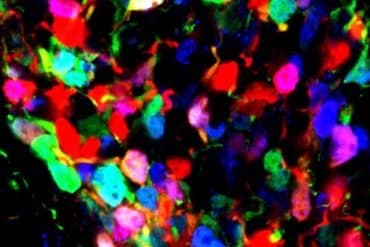Summary: A new study shows that oral arginine, a naturally occurring amino acid, can significantly suppress amyloid-β aggregation in Alzheimer’s disease models. Researchers found that arginine not only prevented Aβ42 from clumping but also reduced plaques and inflammation in mouse and fruit fly models carrying Alzheimer’s-related mutations.
Treated mice showed improved cognitive performance alongside reduced neuroinflammation, indicating broad neuroprotective effects. Because arginine is clinically safe, affordable, and widely available, it holds strong potential as a repurposed therapeutic strategy pending further human studies.
Key Facts:
- Aggregation Blocker: Arginine reduced Aβ42 aggregation in vitro and in Alzheimer’s disease models.
- Neuroprotective Effects: Treatment lowered plaques, decreased inflammatory markers, and improved behavior.
- Clinical Potential: Arginine’s safety and low cost make it a promising candidate for rapid therapeutic repurposing.
Source: Kindai University
Alzheimer’s disease (AD), a progressive neurodegenerative disorder, is one of the leading causes of dementia worldwide, and currently has no definitive cure. Although antibody-based therapies that target amyloid β (Aβ) have recently been developed, their clinical effectiveness remains limited.
These treatments can be costly and cause immune-related side effects, highlighting the need for safer, affordable, and widely accessible approaches that can slow the progression of AD.
In a new study, made available online on October 30, 2025, in Neurochemistry International, researchers from Kindai University and collaborating institutions discovered that oral administration of arginine, a naturally occurring amino acid and safe chemical chaperone, effectively suppresses Aβ aggregation and its toxic effects in animal models of AD.
The researchers emphasized that although arginine is available as an over-the-counter dietary supplement, the dosage and administration protocol employed in this study was optimized for research purposes and does not correspond to commercially available formulations.
The research team included Graduate Student Kanako Fujii and Professor Yoshitaka Nagai from the Department of Neurology, Kindai University Faculty of Medicine, Osaka, and Associate Professor Toshihide Takeuchi from the Life Science Research Institute, Kindai University, Osaka.
Using in vitro assays, the researchers first demonstrated that arginine can inhibit the formation of Aβ42 aggregates in a concentration-dependent manner. Building on these findings, the team evaluated oral arginine in two established AD models:
- A Drosophila model, expressing Aβ42 with the Arctic mutation (E22G)
- An AppNL-G-F knock-in mouse model, carrying three familial AD mutations
In both models, arginine administration significantly reduced Aβ accumulation and alleviated Aβ-induced toxicity.
“Our study demonstrates that arginine can suppress Aβ aggregation both in vitro and in vivo,” explains Prof. Nagai. “What makes this finding exciting is that arginine is already known to be clinically safe and inexpensive, making it a highly promising candidate for repositioning as a therapeutic option for AD.”
In the mouse model, oral arginine significantly decreased amyloid plaque deposition and lowered insoluble Aβ42 levels in the brain. Moreover, arginine-treated mice showed improved behavioral performance and reduced expression of pro-inflammatory cytokine genes associated with neuroinflammation, one of the key pathological features of AD.
These results suggest that arginine’s protective effects extend beyond aggregation inhibition to include broader neuroprotective and anti-inflammatory actions.
“Our findings open up new possibilities for developing arginine-based strategies for neurodegenerative diseases caused by protein misfolding and aggregation,” notes Prof. Nagai.
“Given its excellent safety profile and low cost, arginine could be rapidly translated to clinical trials for Alzheimer’s and potentially other related disorders.”
This research underscores the potential of drug repositioning—repurposing existing, safe compounds for new therapeutic uses—as an efficient pathway toward accessible Alzheimer’s treatments. Because arginine is already used clinically in Japan and has demonstrated high safety and brain permeability, it may overcome several early barriers faced by conventional drug development.
The researchers note that further preclinical and clinical studies are needed to determine whether these therapeutic effects can be replicated in humans and to establish optimal dosing regimens.
Nonetheless, the present findings provide compelling proof of concept that simple nutritional or pharmacological supplementation could mitigate amyloid pathology and improve neurological outcomes.
This study not only deepens our understanding of Aβ aggregation dynamics but also highlights a readily implementable and cost-effective strategy that could ultimately benefit the growing global population affected by AD.
Funding information: This work was supported by the Ministry of Education, Culture, Sports, Science, and Technology (MEXT) (Grant No. 20H05927), Japan Society for the Promotion of Science (JSPS) (Grant Nos. 24H00630, 21H02840, 22H02792, and 25K02432), Japan Science and Technology Agency (JST) Super-Highway Program (SHW2023-03), and National Center of Neurology and Psychiatry.
Key Questions Answered:
A: It inhibits Aβ42 clumping and reduces toxic buildup in cell and animal models.
A: Arginine lowered plaque levels, reduced inflammation, and improved behavior.
A: It is inexpensive, already considered safe, and may be rapidly repurposed.
Editorial Notes:
- This article was edited by a Neuroscience News editor.
- Journal paper reviewed in full.
- Additional context added by our staff.
About this supplements and Alzheimer’s disease research news
Author: Tamaki Kasuya
Source: Kindai University
Contact: Tamaki Kasuya – Kindai University
Image: The image is credited to Neuroscience News
Original Research: Open access.
“Oral administration of arginine suppresses Aβ pathology in animal models of Alzheimer’s disease” by Kanako Fujii et al. Neurochemistry International
Abstract
Oral administration of arginine suppresses Aβ pathology in animal models of Alzheimer’s disease
Although amyloid β (Aβ)-targeting antibody therapies for Alzheimer’s disease (AD) have recently been developed, their clinical efficacy remains limited, and issues such as high cost and adverse effects have been raised.
Therefore, there is an urgent need for the establishment of safe and cost-effective therapeutic approaches that inhibit Aβ aggregation or prevent its accumulation in the brain.
In this study, we report that arginine, a clinically approved and safe chemical chaperone, suppresses Aβ aggregation both in vitro and in vivo. We demonstrated using an in vitro assay that arginine inhibits the aggregation formation of the Aβ42 peptide in a concentration-dependent manner.
In a Drosophila model of AD expressing the Aβ42 peptide with an Arctic mutation E22G, the oral administration of arginine dose-dependently reduced Aβ42 accumulation and rescued Aβ42-mediated toxicity.
In an AppNL-G-F knockin mouse model harboring human APP familial mutations, the oral administration of arginine suppressed Aβ plaque deposition and reduced the level of insoluble Aβ42 in the brain.
The arginine-treated AppNL-G-F knockin mice also showed the improvement of behavioral abnormalities and the reduced expression of the neuroinflammation-associated cytokine genes.
These results indicate that the oral administration of arginine not only reduced Aβ deposition, but also ameliorated Aβ-mediated neurological phenotypes in animal models of AD.
These findings identify arginine as a safe and cost-effective drug candidate that suppresses Aβ aggregation, and highlight its repositioning potential for rapid clinical translation for AD treatment.
Arginine is also potentially applicable to a wide range of neurodegenerative diseases caused by protein misfolding and aggregation.








